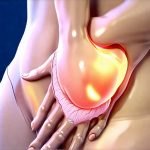Living with a sensitive bladder – often associated with conditions like Overactive Bladder (OAB), Interstitial Cystitis (IC), or simply heightened sensitivity – can significantly impact daily life, particularly as the day winds down. Many find themselves preoccupied with bathroom trips, anxious about nighttime disruptions, and generally unable to fully relax. The evening hours, meant for rest and rejuvenation, often become a source of stress. This is because physiological changes that occur naturally in the evening – decreasing cortisol levels, shifting hormonal balances, and reduced distractions – can actually amplify bladder symptoms for those who are sensitive. A thoughtfully constructed evening routine isn’t about “curing” a sensitive bladder; it’s about proactively managing its effects and creating an environment conducive to peaceful sleep and improved well-being. To further support your nightly wellness, consider incorporating soothing evening teas into your routine.
The key lies in understanding that a calming evening routine is more than just avoiding fluids before bed (though that is important). It encompasses a holistic approach, addressing physical, mental, and emotional factors that can all influence bladder function. This means incorporating strategies to reduce stress, support healthy sleep patterns, and minimize bladder irritation. Building this kind of routine requires experimentation – what works for one person may not work for another – but the effort is profoundly worthwhile. It’s about reclaiming your evenings and taking control of a situation that often feels controlling to you. Many find evening awareness practices particularly helpful for managing anxiety.
Creating a Bladder-Friendly Evening Environment
A supportive environment is foundational to any successful calming routine. This starts with practical considerations within your home. Consider the lighting, temperature, and even sounds in your bedroom. Dimming lights signals to your body it’s time to wind down. A cooler room temperature (around 65-68°F) promotes better sleep. And minimizing noise pollution – or introducing calming sounds like white noise or nature soundscapes – can reduce anxiety which directly impacts bladder sensitivity. Beyond the physical space, consider creating a mental environment of calm. This might involve limiting exposure to stressful news or social media in the hours before bed. Instead, focus on activities that bring you joy and relaxation.
It’s also vital to acknowledge the role of fluid intake. While staying hydrated throughout the day is essential, strategically reducing fluids 2-3 hours before bedtime can minimize nighttime trips to the bathroom. However, avoid drastically restricting fluids – dehydration can actually irritate the bladder further. The goal isn’t deprivation but thoughtful timing. Pay attention to what you’re drinking too. Avoid diuretics like caffeine and alcohol as they stimulate bladder activity. Herbal teas (chamomile, peppermint – if tolerated) or warm water with a slice of lemon are generally better choices. Remember, individual tolerance levels vary significantly; keep a fluid diary to understand your body’s response to different beverages.
Finally, prepare for potential nighttime bathroom visits without inducing anxiety. Ensure the path is clear and well-lit, minimizing stumbling hazards. A nightlight can be particularly helpful. Accepting that occasional trips may happen reduces stress associated with anticipating them. Acceptance, not avoidance, is a powerful tool in managing sensitive bladder symptoms.
Mindful Relaxation Techniques for Bladder Calm
Stress and anxiety are significant triggers for many people with sensitive bladders. When we’re stressed, our bodies enter “fight or flight” mode, which can lead to increased muscle tension – including the detrusor muscle that controls the bladder. This can exacerbate urgency and frequency. Therefore, incorporating mindful relaxation techniques into your evening routine is crucial. These aren’t about eliminating stress entirely (that’s unrealistic), but rather learning how to manage it effectively. Explore structured calm techniques to help ease tension.
Progressive Muscle Relaxation (PMR) involves systematically tensing and releasing different muscle groups in the body. This helps you become aware of tension and learn to consciously release it. Guided meditation, available through apps or online resources, can also be incredibly effective. Focusing on your breath – a simple yet powerful tool – is at the heart of many mindfulness practices. Even five minutes of deep breathing exercises before bed can significantly reduce anxiety and calm the nervous system.
Beyond formal techniques, find activities that personally promote relaxation. This might include reading (a physical book rather than a screen), listening to calming music, gentle stretching, or taking a warm bath (avoiding harsh soaps that could irritate sensitive skin). The key is to disconnect from stressors and engage in activities that nurture your mind and body. Relaxation isn’t a luxury; it’s an essential component of bladder management. Creating natural evening routines can be extremely beneficial.
Gentle Movement & Stretching
Often overlooked, gentle movement can play a surprising role in calming a sensitive bladder. Stiff muscles around the pelvic floor can contribute to bladder irritation and urgency. Light stretching – focusing on areas like the hips, lower back, and legs – can help release tension and improve circulation. Avoid strenuous exercise close to bedtime as it might increase bladder activity. Instead, opt for restorative yoga poses or simple stretches held for 20-30 seconds each.
- Examples include: Cat-cow pose, child’s pose, gentle hip rotations, hamstring stretches.
- Remember to listen to your body and avoid any movements that cause pain or discomfort.
- Consistency is key – even a short routine done regularly can yield significant benefits.
This isn’t about achieving a rigorous workout; it’s about releasing physical tension that may be exacerbating bladder symptoms. The act of moving intentionally also encourages mindfulness, drawing your attention away from anxious thoughts and focusing on bodily sensations. This mindful movement promotes a sense of calm and grounding before bed.
Dietary Considerations – Evening Focus
While daytime dietary habits are important, the evening meal and snacks offer an opportunity to further support bladder health. As mentioned earlier, avoid known irritants like caffeine, alcohol, and artificial sweeteners. Spicy foods can also be problematic for some individuals. Instead, focus on easily digestible foods that won’t put extra strain on your digestive system (and consequently, your bladder). If you’re looking for meal inspiration, consider low-irritation meal options.
- Consider incorporating anti-inflammatory foods into your evening meal – such as blueberries, salmon, or leafy greens.
- Smaller portions are generally better, especially before bed, to avoid putting pressure on the bladder.
- If you experience nighttime cravings, choose bladder-friendly snacks like a small banana or a handful of almonds.
It’s crucial to identify your trigger foods and adjust your diet accordingly. Keeping a food diary alongside a bladder diary can help you pinpoint specific dietary culprits. Understanding your individual sensitivities is paramount.
Sleep Hygiene – The Cornerstone of Calm
Poor sleep exacerbates almost every health condition, including sensitive bladder symptoms. When we’re tired, our bodies are less able to cope with stress, leading to increased anxiety and heightened bladder sensitivity. Therefore, prioritizing good sleep hygiene is essential. This means establishing a regular sleep schedule, even on weekends. Create a relaxing bedtime routine that signals to your body it’s time to rest.
- Ensure your bedroom is dark, quiet, and cool.
- Avoid screen time (phones, tablets, TVs) at least an hour before bed. The blue light emitted from screens interferes with melatonin production, disrupting sleep.
- Consider a relaxing activity like reading or taking a warm bath.
- If you struggle to fall asleep, avoid clock-watching – it only increases anxiety. Get out of bed and do something calming until you feel sleepy.
Consistent, restorative sleep is not just about feeling rested; it’s about giving your body the opportunity to repair and regulate itself, including its bladder function. Prioritizing sleep is prioritizing bladder health. To enhance your nighttime routine, explore evening rituals for better flow sleep.





















